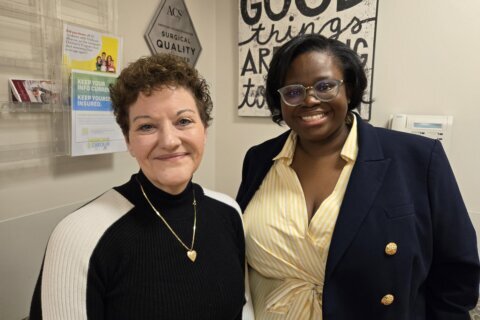As college and university students return to campus, hopeful of a return to “normal” with COVID-19 cases lessening in severity, public health experts want to make sure young adults help prevent the spread of the monkeypox virus.
“A college environment certainly can be a high-risk environment for the spread of contact-based monkeypox,” said Dr. Anisha Abraham, pediatrician and acting chief of the Adolescent Medicine department at Children’s National Hospital.
Life on college campuses, in which students are often in close contact, raises the risk of transmission.
“The highest kind of likelihood of spread is if there’s direct skin-to-skin contact, but you can still sometimes get monkeypox from things like towels or linens,” said Abraham.
The recent jump in monkeypox cases has sprinted ahead of the number of vaccines available, so public health officials are trying to provide guidance to limit its spread.
The symptoms generally revolve around flu-like symptoms and a rash.
“If you develop any symptoms related to having pustules or blisters, along with, potentially a fever or joint aches, those are important reasons for you to see a health care provider to make sure you don’t have monkeypox,” said Abraham.
While the Centers for Disease Control and Prevention hasn’t specifically provided guidance for college students, recommendations updated Aug. 4 refer to group settings, including “dormitories at institutes of higher education.”
If a monkeypox case has been identified, the CDC recommendation includes self-isolation: “Ensure that residents with monkeypox wear a well-fitting disposable mask over their nose and mouth and cover any skin lesions with long pants and long sleeves, bandages, or a sheet or gown if they need to leave the isolation area or if isolation areas are not yet available.”
According to the CDC: “A person is considered to be infectious until there is full healing of the rash with formation of a fresh layer of skin.”
A parent’s role, according to the doctor
“Going off to college and university is an important time for young people to become more independent with their health care,” Abraham said.
“But I think it’s also important for parents to remind university students to make sure they are staying healthy, that they’re avoiding situations where potentially they could infected, and to make sure they’re seeking care if they have an issues.”
Current CDC guidance includes limiting the number of sexual partners to reduce the likelihood of exposure to the virus.
“You can certainly be in a heterosexual relationship and still get monkey pox, because at the end of the day, its from skin-to-skin contact, though we also know there have been some cases where there’s just contact with objects and materials, like bedding or linen,” said Abraham.
Abraham said being cognizant of the public health implications is key.
“It’s important to have that balance between avoiding panic, but also being educated and aware of what some of the signs are, and ways to prevent monkeypox.”








